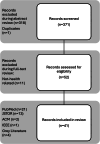A systematic review of responsible stewardship of research and health data from Indigenous communities
- PMID: 40764752
- PMCID: PMC12326002
- DOI: 10.1038/s41746-025-01902-w
A systematic review of responsible stewardship of research and health data from Indigenous communities
Abstract
There is growing recognition of the moral and legal authority of Indigenous Peoples to regulate research and other matters that involve their communities under the principle of Indigenous Data Sovereignty (IDS). This systematic review has two aims: (1) detail IDS considerations and practices in health research in the United States and other global contexts; and (2) identify frameworks that operationalize IDS practices for responsible conduct of research and use of data-driven technologies. Our review returned 41 relevant articles detailing specific considerations for the collection, access, and use of Indigenous data, and sub-themes such as cultural and regional considerations. More than half of the articles articulated a theoretical framework or detailed set of guidelines for using Indigenous data, with two especially focused on digital data considerations. Results indicate that intentional engagement with Indigenous researchers and communities will minimize harm and maximize benefits for all participating in research and technology development.
© 2025. The Author(s).
Conflict of interest statement
Competing interests: T.K.M. is an employee of the startup company S-3 Research LLC. T.K.M. is also a co-founder and co-owner of the company. S-3 Research is a minority owned small business that was originally created through a National Institute on Drug Abuse startup business award and has been subsequently funded through government contracts with Federal agencies to develop research tools and services for data science in public health, including social listening, data mining, and machine learning approaches. All other authors declare no competing interests.
Figures

Similar articles
-
Access to maternal health services for Indigenous women in low- and middle-income countries: an updated integrative review of the literature from 2018 to 2023.Rural Remote Health. 2024 May;24(2):8520. doi: 10.22605/RRH8520. Epub 2024 May 25. Rural Remote Health. 2024. PMID: 38826130
-
Sexual Harassment and Prevention Training.2024 Mar 29. In: StatPearls [Internet]. Treasure Island (FL): StatPearls Publishing; 2025 Jan–. 2024 Mar 29. In: StatPearls [Internet]. Treasure Island (FL): StatPearls Publishing; 2025 Jan–. PMID: 36508513 Free Books & Documents.
-
Factors that impact on the use of mechanical ventilation weaning protocols in critically ill adults and children: a qualitative evidence-synthesis.Cochrane Database Syst Rev. 2016 Oct 4;10(10):CD011812. doi: 10.1002/14651858.CD011812.pub2. Cochrane Database Syst Rev. 2016. PMID: 27699783 Free PMC article.
-
The educational effects of portfolios on undergraduate student learning: a Best Evidence Medical Education (BEME) systematic review. BEME Guide No. 11.Med Teach. 2009 Apr;31(4):282-98. doi: 10.1080/01421590902889897. Med Teach. 2009. PMID: 19404891
-
Survivor, family and professional experiences of psychosocial interventions for sexual abuse and violence: a qualitative evidence synthesis.Cochrane Database Syst Rev. 2022 Oct 4;10(10):CD013648. doi: 10.1002/14651858.CD013648.pub2. Cochrane Database Syst Rev. 2022. PMID: 36194890 Free PMC article.
References
-
- Wallerstein, N. B. & Duran, B. Using community-based participatory research to address health disparities. Health Promot. Pract.7, 312–323 (2006). - PubMed
Grants and funding
LinkOut - more resources
Full Text Sources

